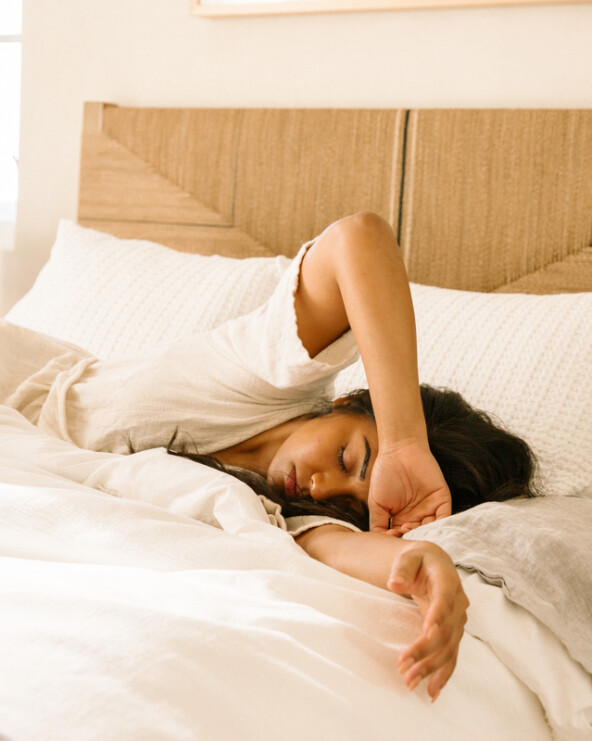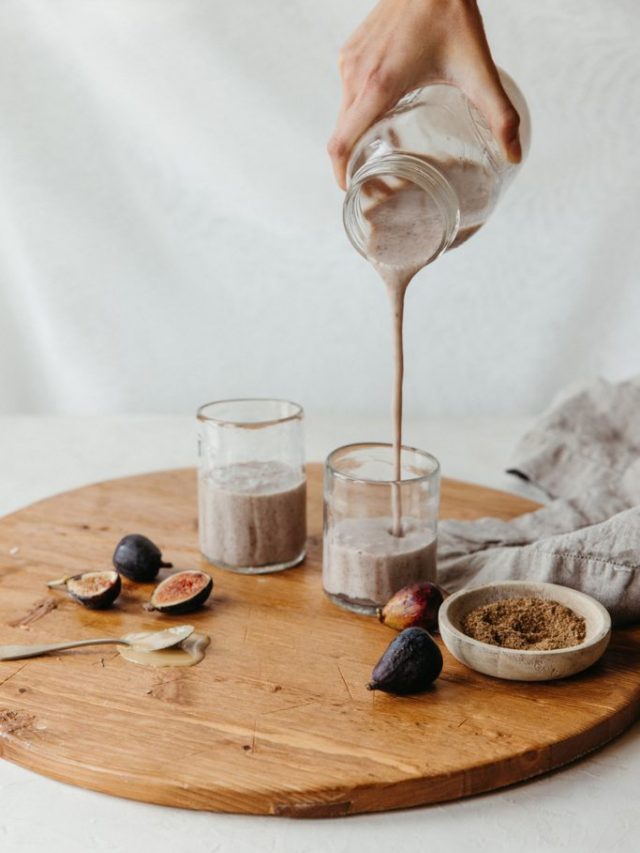Counting imaginary sheep and pleading with the sandman for a good night’s sleep? We empathize. In fact, the quest for restful zzz’s unites us a whopping 50-70 million of us. In a world filled with endless notifications, overflowing schedules, and highly-processed treats, it’s no surprise sleep is hard to come by. Fortunately, sweet dreams can be a nightly reality. Supportive daily habits and nourishing foods fit the bill. With that in mind, we’re diving into foods that help you sleep—powerhouse ingredients to put your mind at rest. Your bedtime snack just got an upgrade.
image above by Riley Reed
- How does diet impact sleep?
- Melatonin-Rich Foods to Reach For
- Can a melatonin supplement improve your sleep?
- Eat Tryptophan-Packed Foods
- Blood Sugar and Sleep: A Two-Way Street
- Sneaky Culprits That Make Sleep More Difficult
- Beyond diet, what encourages a good night's rest?
- Hot and Cold Therapy for Better Sleep
- 10 Foods That Help You Sleep

How does diet impact sleep?
The link between diet and sleep is profound. On one end of the spectrum, a diet rich in balanced nutrients, minimally-processed foods, and healthy fats provides the body with tools to regulate sleep patterns. In part, we have stable blood sugar to thank! Conversely, indulging in high-sugar and heavily processed foods can disrupt our sleep cycles, leading to difficulties falling asleep and maintaining deep rest. Plus, if you know, you know: large meals close to bedtime may result in indigestion. Of course, caffeine and alcohol are also known to wreak havoc on our sleep patterns too.

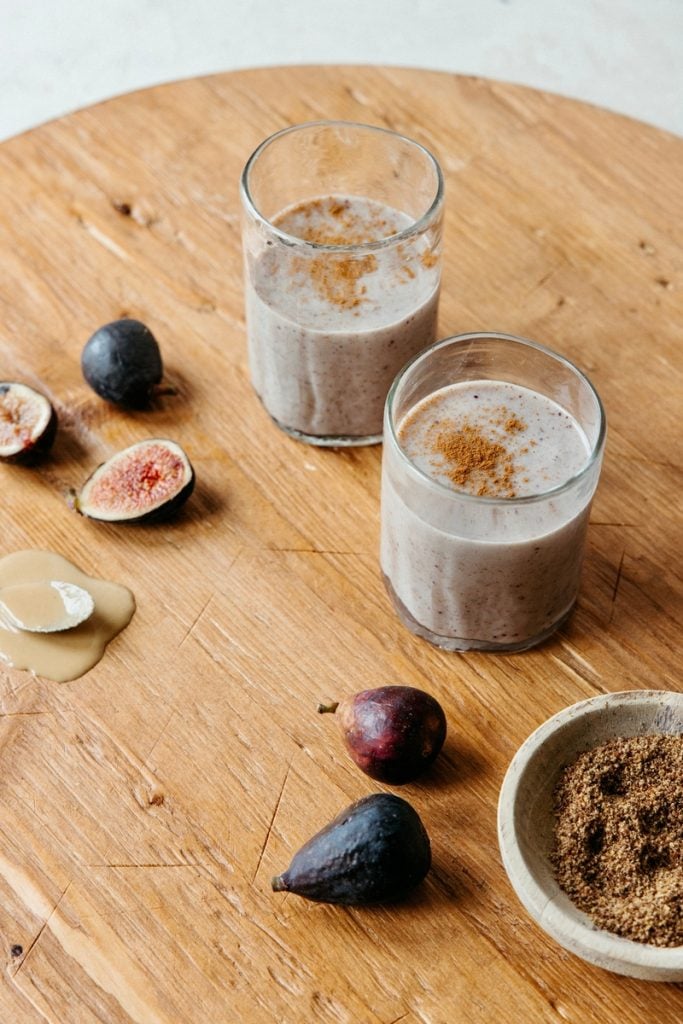
Melatonin-Rich Foods to Reach For
You’ve probably heard of melatonin (it helps regulate our sleep-wake cycle), but did you know that certain foods contain it? Ultimately, adequate melatonin enhances our ability to fall asleep and stay asleep. Although most people produce enough melatonin for their general needs, research shows that foods high in melatonin can improve sleep. Cherries, particularly tart cherries, are a top choice. These little red powerhouses are packed with melatonin. Try a glass of tart cherry juice in the evening. Other melatonin favorites: pistachios, milk, and oats.
Get our full list of foods with melatonin here.


Can a melatonin supplement improve your sleep?
Depends. Melatonin is generally safe for short-term use, but studies on its long-term impact are limited. Immediate side effects are typically mild, but it can cause dependency, headaches, short-term feelings of depression, daytime sleepiness, dizziness, stomach cramps, and irritability. Additionally, melatonin can have strong effects on our sex steroid hormones. All in all, there may be more downsides than upsides to taking melatonin. Instead, you may want to try magnesium, l-theanine, ashwagandha, or a cup of chamomile tea.
Chat with your healthcare provider before adding new supplements to your routine!
Eat Tryptophan-Packed Foods
Along with melatonin-rich foods, ingredients with tryptophan are also your bedtime bestie. Tryptophan is an essential amino acid. It plays a key role in the production of serotonin, a neurotransmitter that contributes to feelings of relaxation. In other words, tryptophan-rich foods can promote better sleep. Turkey is famously known for its tryptophan content, and a modest turkey sandwich on sourdough might be a soothing bedtime snack. Other options? Greek yogurt, chicken, and tofu.
Get our full list of foods high in tryptophan here.

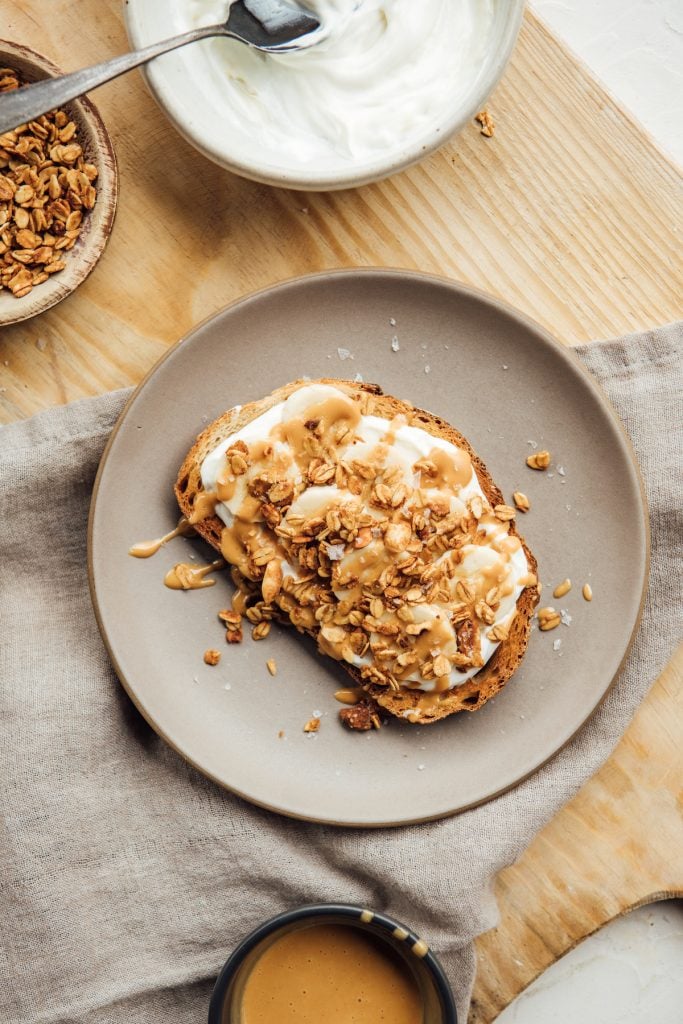
Blood Sugar and Sleep: A Two-Way Street
Melatonin and tryptophan aside, maintaining stable blood sugar levels is crucial for a good night’s sleep. When blood sugar levels fluctuate, it can lead to nighttime awakenings and disrupted sleep patterns. To achieve this balance, pair complex carbohydrates (like whole grains or fruit) with a source of protein (string cheese, Greek yogurt, cottage cheese, tofu, etc.) or healthy fats (nuts, coconut butter, avocado, etc.) Combining carbs with protein and/or fat releases glucose slowly, preventing the sudden sugar spikes and crashes that can interrupt your sleep. Curious to know if your blood sugar levels are within normal range? Consider wearing a continuous glucose monitor.
Sneaky Culprits That Make Sleep More Difficult
Unfortunately, there are certain foods (and bevvies) that make sleep more difficult—either to fall asleep or stay asleep. These are a few to keep in mind:
Caffeine: Coffee, caffeinated tea, energy drinks, and sodas are potent stimulants that disrupt sleepiness. Limit your caffeine intake, especially in the afternoon and evening. Instead, opt for a calming, soothing tea. And if you need an afternoon pick-me-up, consider these alternatives.
Alcohol: While alcohol may initially make you feel drowsy, it can disrupt your sleep cycle, leading to more fragmented and less restorative sleep. It’s best to enjoy alcohol in moderation and avoid it too close to bedtime.
Spicy meals: These can lead to indigestion and acid reflux, which can be particularly uncomfortable when you’re lying down.
High-sugar treats: Foods high in sugar can cause a rapid spike in blood sugar levels, followed by a crash. This fluctuation can lead to nighttime awakenings and disrupted sleep patterns.
Fried foods: Like spicy foods, high-fat meals can also lead to indigestion and discomfort, making it more challenging to fall asleep and stay asleep.
Acidic dishes: For some, acidic foods—like citrus fruits and tomato-based dishes—can cause acid reflux and heartburn, which can disrupt your sleep.
Excessive water intake: Yes, staying hydrated is essential, but consuming excessive amounts of water right before bedtime can lead to waking up frequently during the night to use the restroom. Space out your hydration earlier in the day!


Beyond diet, what encourages a good night’s rest?
When it comes to getting a good night’s rest, your grocery basket is only one piece of the puzzle. Your habits, rituals, and stress levels all make a difference. Fortunately, there are practical strategies you can implement to inspire rejuvenating sleep.
Regular sleep schedule
Maintain a consistent sleep schedule as often as possible. Yes, even on weekends! This helps regulate your body’s internal clock and improves sleep quality.
Avoid long naps
Long—or late-afternoon—naps can disrupt your nighttime sleep. If you need to nap, keep it short (20-30 minutes).
Daylight exposure
Spending time outdoors during the day, especially in the morning, can help reset your circadian rhythm. Natural light exposure improves your body’s production of melatonin (our sleep hormone).
Limiting screen time
You know this, I know this, we all know this. The blue light emitted by smartphones, computers, and TVs can interfere with melatonin production and disrupt your sleep. Avoid screens at least an hour before sleep, or use blue light filters on your devices.
A bedtime routine
A calming bedtime routine signals to your body that it’s time to wind down. Activities like reading a book, taking a warm bath, listening to mellow classical music, or practicing relaxation techniques can be helpful.
An optimal sleep environment
This goes without saying, but ensure your sleep space is conducive to rest. This includes a comfortable mattress and pillows, a cool room temp, and minimal noise and light.
Regular exercise
Regular physical activity can improve sleep, but try to finish exercising at least a few hours before bedtime.
Stress management
Inevitably, stress and anxiety make it difficult to fall asleep. As you wind down, practice deep breathing, meditation, or yoga to alleviate stress and promote restful sleep.
Red or amber lights
Red or amber light—as opposed to blue light—is less likely to interfere with melatonin production. Opt for red or amber nightlights, dimming bright lights, or switch to candlelight where possible.

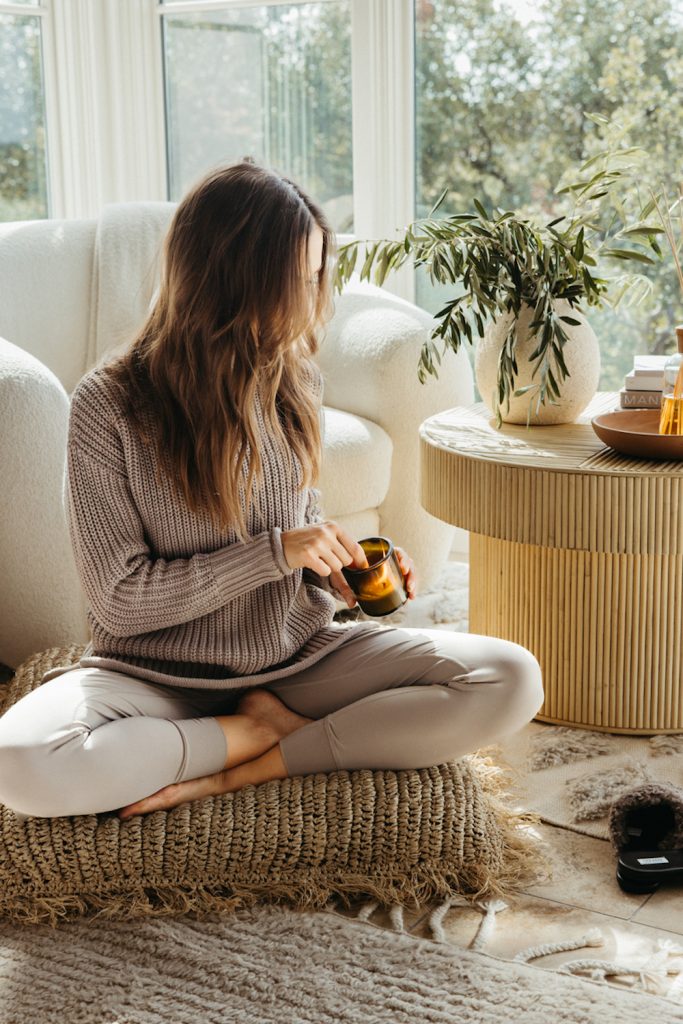
Hot and Cold Therapy for Better Sleep
Another non-food way to improve your sleep? Hot and cold therapy. Hot therapy—such as a warm bath or sauna—before bedtime, relaxes muscles and relieves tension. It’s particularly helpful for muscle soreness. Cold therapy, on the other hand, can be especially useful if you have difficulty falling asleep in a warm room. A cooler room temp (ideally no higher than 67 degrees Fahrenheit) can signal it’s time to sleep. Additionally, consider cooling pillows or bedding with moisture-wicking properties to reduce night sweats.
10 Foods That Help You Sleep
Time to elevate your sleepy time snack game. From cherries to chia seeds, stock your fridge and pantry with these bedtime wonders.
1. Cherries
As mentioned, cherries are a natural source of melatonin, a hormone that regulates the sleep-wake cycle. They’re an excellent choice for promoting sleep. Try this romaine, cherry, and feta salad for dinner.
2. Greek Yogurt
Plain Greek yogurt is high in protein, rich in tryptophan, and low in sugar, and it can help regulate blood sugar levels while you sleep. In need of ideas? We have plenty of Greek yogurt inspo. At the very least, opt for a small bowl of Greek yogurt with frozen cherries, chia seeds, and a drizzle of almond butter.
3. Chia Seeds
Speaking of chia seeds, they’re are an excellent source of fiber and healthy fats, and they’re another ingredient that can help keep blood sugar levels stable throughout the night. Prep a batch of this vanilla chia pudding to enjoy after dinner.
4. Oats
Oats contain complex carbohydrates that can increase the production of serotonin, a neurotransmitter that contributes to relaxation and improved sleep! Have a small bowl of oatmeal with nuts and seeds or keep a stash of these oatmeal cookies in your freezer.
5. Almonds
Almonds are a great source of magnesium, which helps reduce muscle tension and stress, making it easier to unwind before bedtime. Have a handful with a few pieces of dark chocolate or add a spoonful of almond butter to a small bowl of ice cream.
6. Fatty Fish
Fatty fish are high in omega-3 fatty acids, which can help reduce anxiety and improve sleep quality by regulating serotonin production. Enjoy a piece of whole-grain toast with a smear of cream cheese and a thin layer of smoked salmon. Otherwise, this hot honey-glazed salmon is a dinnertime winner.
7. Warm Milk
A warm glass of milk is rich in tryptophan, which can lead to better sleep. Add a scoop of your favorite chocolate protein powder and a drizzle of maple syrup for a decadent yet nourishing bedtime hot cocoa.
8. Leafy Greens
Leafy greens, like spinach, are high in calcium, which helps the brain use tryptophan to manufacture melatonin, enhancing sleep quality. Add leafy greens to your dinner or make a simple green smoothie prior to hitting the hay.
9. Turkey
Turkey is a good source of tryptophan, which, when combined with carbohydrates, can promote relaxation and improve sleep. Make a few turkey roll-ups to nosh on in the evening: deli turkey, a smear of Dijon mustard (or hummus), and a slice of cheddar cheese.
10. Tofu
Tofu is rich in protein, calcium, and isoflavones, a type of phytoestrogen that can increase serotonin. This study found that adults who ate two or more soy servings slept longer and reported better sleep quality! Add this banh mí bowl to your dinner repertoire or this vegan chocolate mousse for dessert.

